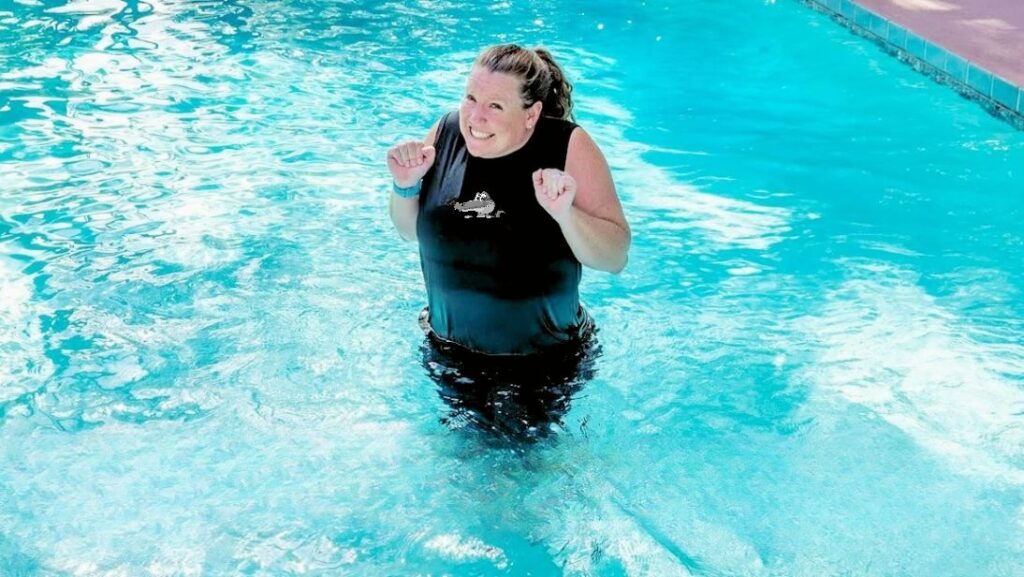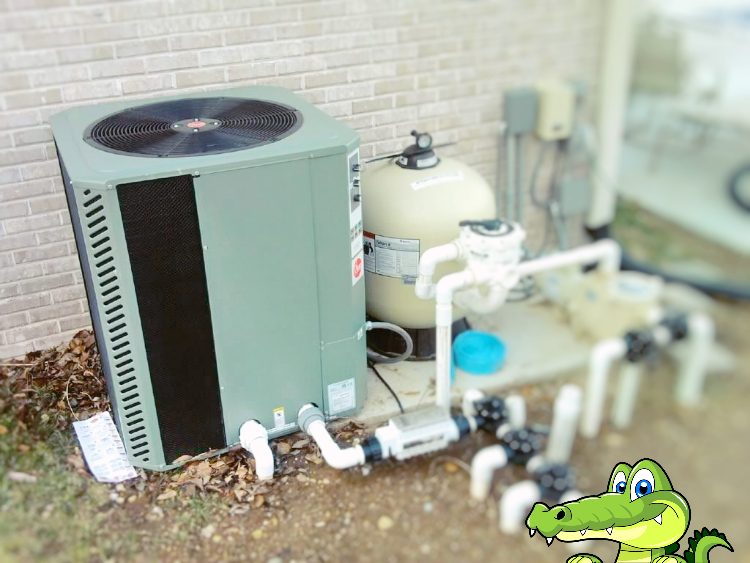Home » POOL EQUIPMENT Florida » POOL EQUIPMENT Miami » BLOG-EQUIP-Mia-Heaters

Despite its warm weather, Miami is seeing a growing trend in pool heater usage. Rainfall, pool size, and sunlight exposure greatly affect your pool’s temperature. Alligator Pools ensures year-round enjoyable water temperatures with professional heater installations. When searching for “Pool heater installation near me” Alligator Pools stands out, with approximately 50 installations each year, demonstrating our expertise and the increasing demand for this service.
In conclusion, it is key to understand these nuances in order to choose the right pool heater. If you need help, we would be happy guide you on your journey to purchase a new pool heater for your pool. Give us a call today!
Heat pumps are an efficient method for heating pools, using only electricity. Though slower to heat than gas heaters, they maintain desired temperatures well. This makes them a particularly suitable choice for Miami’s climate, where drastic temperature changes are less frequent. In Miami’s climate, brands like Thermeau and Rapak are popular choices for heat pumps. These systems use an evaporator coil and a fan to capture warm air, transferring heat to the pool water through a heat exchanger. Finally, heat pumps have higher initial costs but lower operational expenses due to efficiency.

When selecting a heat pump, just like with gas heaters, it’s advisable to opt for the largest unit within your budget. The size of the heat pump you need depends on the desired water temperature and the average outside temperature. The Department of Energy suggests a simple formula to determine the minimum size of the heat pump needed: Pool Area x Temperature Rise x 12. This calculation helps ensure that the heat pump you choose is capable of maintaining your pool at the ideal temperature for your needs.
A unique advantage of some heat pumps is their dual functionality as chillers. This feature is particularly beneficial in very hot climates, like Miami, where pool water can naturally reach mid-90s temperature. Having a heat pump that can also cool the water provides a comfortable swimming experience even during the hottest days. This dual capability enhances the value of investing in a heat pump, offering both heating and cooling solutions to adapt to varying weather conditions. While this is often highlighted as a feature, it’s not all that effective in our experience with the hot, humid conditions of Miami.
Gas heaters are a common solution for pool heating, especially in regions where quick and powerful heating is essential. Using either natural gas or propane, these heaters are capable of rapidly increasing the water temperature, irrespective of external weather conditions. This makes them a preferred choice in colder climates where extending the swimming season is a priority.
Gas pool heaters, commonly found in cooler regions of the country, are typically powered by propane or natural gas. They are favored in these areas due to their ability to rapidly heat pool water, regardless of the ambient temperature. This feature is particularly beneficial in regions where quick and powerful heating is essential for extending the swimming season.
In contrast, in Miami, electric heaters are more prevalent. This preference is driven by Miami’s milder climate, where rapid heating isn’t as critical, and the availability of cheaper electrical costs compared to the rest of the country. Furthermore, Florida has one of the lowest rates of homes using natural gas as an energy source, as highlighted in a study published by Statista Research Department on August 25, 2023. This lack of natural gas infrastructure in Florida tilts the balance towards electric heaters being more popular in the Miami area.
When considering gas heaters, it’s important to select a model with an appropriate BTU (British Thermal Unit) rating. A higher BTU heater can quickly increase water temperature, making it a suitable choice for those needing rapid heat-up. However, if you’re in Miami, where the emphasis is on maintaining a consistent temperature rather than quick heating, a smaller gas heater might be adequate, provided your gas meter and plumbing can support it.
This knowledge is essential for making an informed decision about whether a gas pool heater is right for your needs in Miami. While they offer quick heating and are a popular choice in cooler climates, the specific conditions in Miami, including lower natural gas usage and preference for electric heaters, might influence your decision towards other types of heaters that are more in line with the local infrastructure and energy cost considerations.
The primary advantage of gas heaters is their efficiency in rapidly heating large volumes of water, making them ideal for quick temperature increases. However, they are generally more expensive than other types of heaters, both in terms of initial purchase and operational costs. This is particularly true in regions like Miami, where natural gas infrastructure is less developed, and electric heaters are more cost-effective. Additionally, the fluctuating prices of propane and natural gas can add to the long-term costs and unpredictability of using gas heaters. Finally, for homes in Miami without an existing gas line or tank, the installation of a gas heater might not be the most practical or economical choice, considering the regional energy preferences and infrastructure.
Solar heating operates by circulating water through small pipes within solar panels, where it is heated by the sun. This eco-friendly method is highly efficient during daylight hours. However, one limitation of solar heating is its reliance on sunlight; these systems do not function at night. In conclusion, if you want solar, you must ensure your pool pump can move water through solar panel plumbing.
Solar heating has higher initial costs but is cost-effective long-term. Additionally, solar heaters often have a longer lifespan compared to other types of pool heaters. This durability is attributed to the lack of moving parts, reducing the likelihood of mechanical failures over time.
Using a solar cover significantly cuts heating costs, regardless of heater type. Solar covers help retain heat, reduce chemical usage, and minimize water evaporation when the pool is not in use. This practice is particularly beneficial for solar heated pools, enhancing their efficiency and cost-effectiveness. Moreover, maintaining proper water chemistry, especially pH levels, is crucial for all pool heaters. Low pH levels can cause rapid deterioration of heater components, thereby shortening their lifespan.
The decision to install a pool heater is becoming increasingly popular in Miami. The key is to choose the right heater that aligns with your pool and lifestyle needs. At Alligator Pools, we specialize in pool heater installations, guiding you through selecting the best heater for your situation. Our expertise ensures you get the most out of your pool heater investment.
Beyond pool heating, Alligator Pools excels in comprehensive pool equipment installations in Miami. Our services range from expert heater installations, equipment setups or helping you convert your pool to saltwater. Contact us in Miami for a personalized consultation and discover how we can enhance your swimming pool experience with top-notch equipment solutions.
The cost of a pool heater in Miami typically ranges between $3,000 and $6,000. This price range depends on various factors, including the type of heater, size of your pool, and specific usage requirements. Consider these factors and operational expenses to choose the best, cost-effective pool heater. Alligator Pools provides personalized consultations and detailed estimates to help you make an informed decision.
In Miami, the cost of an electric heat pump typically ranges between $4,000 and $6,000. However, this price can vary depending on several factors such as the size of your pool, the specific model of the heat pump, and installation requirements. It’s important to remember that while the initial investment may be significant, electric heat pumps are energy-efficient and can lead to cost savings over time. For a precise quote based on your pool’s specific needs, Alligator Pools is happy to provide a consultation and detailed estimate.
The cost of a gas pool heater in Miami ranges between $3,000 – $4,000. This estimate can vary based on the specific requirements of your pool, such as size and heating capacity, as well as any additional installation complexities. While gas heaters offer rapid heating capabilities, it’s important to factor in the ongoing operational costs and the need for a suitable gas line setup. Alligator Pools can provide a detailed estimate and professional guidance to ensure you choose the best heating solution for your pool.
The right pool heater depends on several factors including your pool’s size, location, desired temperature, and energy efficiency needs. Alligator Pools can help assess these factors to recommend the best heater for your situation. BUT, as a general statement, we most commonly recommend electric heat pumps in Miami.
No, Alligator Pools does not handle the connection of gas lines to gas pool heaters. This task must be performed by your gas utility provider to ensure safety and compliance with local regulations. However, we can assist with all other aspects of gas pool heater installation, from selecting the right model to setting up the heater unit itself.